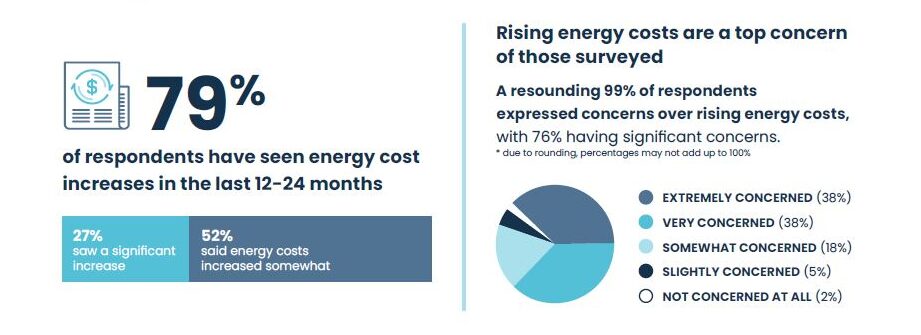GridPoint unveils results of “The Commercial Building Energy Efficiency Survey” with insight from more than 800 energy, facilities and sustainability decision-makers
RESTON, Va.– Feb. 14, 2023 — GridPoint, a leader in building energy management technology that decarbonizes commercial buildings and accelerates a more sustainable energy future, today released the results of “The Commercial Building Energy Efficiency Survey,” gathering feedback from more than 800 professionals in the U.S. and Canada who serve as decision-makers for their organizations’ energy efficiency, facility management or sustainability efforts.
Energy Efficiency Takes Priority in 2023
The vast majority of those surveyed will embark on energy-efficient upgrades in 2023 – 90% of participants said they planned to increase energy efficiency improvements. While energy efficiency efforts were rated as highly important to respondents regardless of role (89%), when pinpointing respondents working in facilities management, a resounding 98% of respondents rated energy efficiency as being extremely or very important to their role and responsibilities within their organization.
Energy Efficiency Efforts to Get a Major Upgrade
To date, a significant portion of respondents have implemented lower-cost strategies to reduce energy use such as energy-efficient lighting (70%) or smart thermostats (59%). Strategies that require a larger investment in time and resources currently rank lowest for energy efficiency efforts already in place. The survey found that only 30% of respondents have submetering in place and 33% currently leverage carbon accounting reporting.
But when looking at energy efficiency and sustainability initiatives respondents are planning to implement this year, the survey demonstrates that professionals intend to take a deeper dive into available tools and technology.
The top strategies respondents plan to implement in 2023 include:
- Carbon accounting reporting (40%)
- Demand response/demand management (39%)
- Utility energy efficiency programs (39%)
- EV charging (39%)
- Renewable energy sources (38%)
- Submetering (38%)
All of the above initiatives that respondents plan to implement demonstrate more advanced energy strategies and an increased commitment to decarbonization and sustainability.
Rising Energy Costs Likely Accelerating Energy Efficiency Plans
Significant increases in energy costs are likely prompting those surveyed to dedicate additional resources toward energy efficiency and explore new strategies in an attempt to compensate for rising energy bills. Rising energy costs are a top-of-mind issue across the board with 99% of respondents expressing at least some level of concern for rising electricity bills. In terms of realized energy cost increases, 79% of respondents experienced energy cost increases in the last 12 to 24 months with 27% categorizing the increases as “significant.”
Concerns Extend Beyond the Bottom Line
Grid reliability is another top issue for the professionals surveyed as 94% expressed at least some level of concern over grid reliability, with 62% stating they have significant concerns. Power disruptions and widespread blackouts pose a serious risk to companies that need to power physical locations and ensure guest safety and comfort, like retailers or restaurants, in order to generate revenue. Of the total participants, the majority work in retail (40%) and financial services (17%), healthcare (14%) and restaurant/food services (10%) were the other top industries represented in the survey.
It is also clear that the validity of climate change is no longer up for debate, especially among professionals tasked with improving energy efficiency and sustainability. A staggering 92% of respondents expressed concern about the negative impact climate change could have on their organization’s operations. Nearly a quarter of respondents were extremely concerned (24%) and 35% said they were very concerned.
“The survey results validate the interesting intersection we are seeing in terms of rising energy cost inflation as a result of the energy transition, macroeconomic factors accelerating the adoption of technology that reduces energy costs and pressure from customers and shareholders on businesses to reduce their carbon footprint,” said Mark Danzenbaker, CEO of GridPoint. “These pain points are materializing into an incredibly positive outcome – the motivation among commercial businesses to make significant advances in sustainability is at an all-time high.”
To view the survey results, download GridPoint’s infographic, “The Commercial Building Energy Efficiency Survey”
Survey Methodology
Commissioned by GridPoint, The Commercial Building Energy Efficiency Survey was conducted by Qualtrics, between Nov. 2022 and Jan. 2023. More than 800 respondents in the U.S. and Canada, employed in a managerial role and involved in their organization’s energy, sustainability or facility management decision-making, participated in the survey. Of those surveyed, 64% of respondents operate buildings under 50K sq. ft. while 32% manage buildings larger than 50K sq. ft. Additionally, 53% of participants manage, on average, a portfolio of more than 50 buildings/sites and 47% operate less than 50 buildings/sites. The majority of respondents work in the retail (40%), financial services (17%), healthcare (14%) and restaurant/food service (10%) industries.


